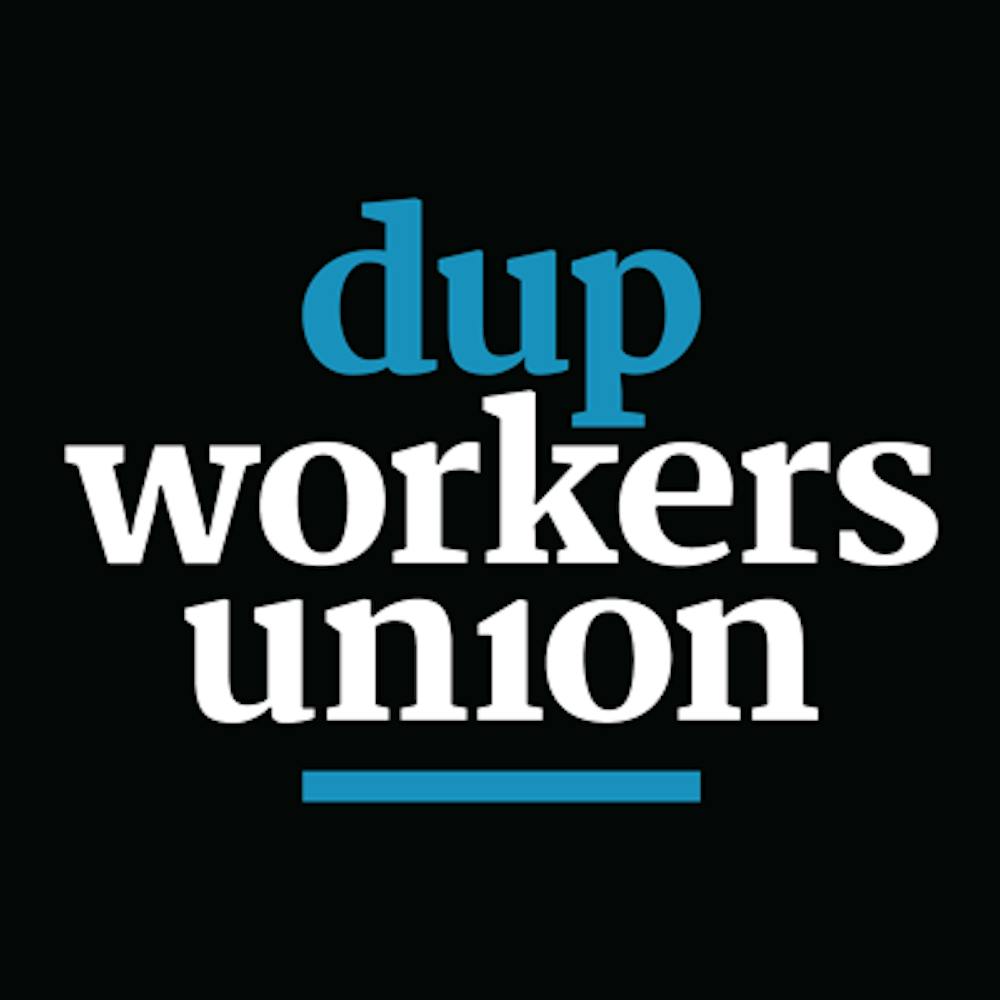Workers at Duke University Press are seeking legal certification for their newly formed union and putting unionization to a formal vote following a lack of voluntary recognition from DUP leadership.
The Duke University Press Workers Union, a unit of The NewsGuild, TNG-CWA Local 32035, went public in March, with members citing issues with DUP management, inadequate pay and insufficient professional growth opportunities as motivators for unionizing.
“To make the press a truly just and equitable place to work, we need the structural change that a union brings—the ability for workers to have a say in our own conditions and work with management to address issues as they come up,” wrote Jessica Castro-Rappl, DUP academic exhibits coordinator and publicist, in an email to The Chronicle.
A nonprofit publishing house that produces over 140 books and 50 journals annually, DUP is staffed by 80 non-management employees. A majority submitted signed cards to the National Labor Relations Board indicating their desire for a union, surpassing the required 30% of employees, according to Castro-Rappl.
The organization filed for an NLRB-conducted election on May 3. If a majority of DUP employees vote in favor of a union, the NLRB will certify the DUP Workers Union. The date of the unionization vote has not yet been determined.
According to a union press release, Duke administration and DUP management have met regularly with law firm Ogletree Deakins since March. The firm has represented several employers fighting unionization in recent years.
The University and DUP management can choose to recognize the union at any point in the organizing process if they believe that a majority of workers support it.
“Duke University will observe all legal requirements of the union organizing process. The University supports the right of every employee to vote on their potential representation,” wrote Michael Schoenfeld, vice president for government relations and public affairs, in an email to The Chronicle.
Schoenfeld did not specifically comment on whether or not Duke was working with Ogletree Deakins for any reason related to the union. DUP Director Dean Smith did not respond to multiple requests for an interview regarding claims made by union members.
Overworked and underpaid
Inadequate compensation is a longtime concern of some DUP employees, even those who have higher degrees and many years of experience, according to a DUP staff member, who requested to remain anonymous.
Castro-Rappl has worked at DUP since 2015. She wrote that despite being promoted twice and receiving an “exceptional” rating on her last performance evaluation, her salary is equal to that of an employee who is “minimally qualified” according to Duke’s pay structure.
“There’s no clear way to advance along the pay scale,” Castro-Rappl wrote. For some DUP employees, it is difficult to afford rent in Durham or support a family without taking on a second job, she added.
The anonymous staffer, who has worked at DUP for five years, said that they also fall into the "minimally qualified” first quartile of the salary range and make “significantly less than $40,000 a year.” The staffer added that DUP employees are overworked and poorly paid, which may be a reason why the organization experiences frequent turnover.
"It's so common for us to hear that a valued colleague no longer works at the press, effective immediately," Castro-Rappl wrote.
Two recent rounds of unexplained job restructuring by DUP management also left some workers anxious, according to Castro-Rappl. During the first round, in January 2020, two positions were eliminated and the workers were laid off, though one was re-hired for a different role a few months later. In March 2021, another two positions were removed and the staff members holding those positions were laid off.
“Some of the people who were let go had been here for decades, so that was scary for people thinking about their own positions, but also concerning to see these people go without any warning or real explanation,” said the anonymous staffer. “It was not based on loss of funds from COVID-19 or anything like that. We’re actually doing quite well as a press.”
“I think a lot of us see it as we need to [unionize], or we might have to just seek work elsewhere,” the anonymous staffer continued.
‘Gambling with our livelihoods’
In an email to the DUP listserv on May 10, a copy of which was obtained by The Chronicle, three DUP workers wrote that they were not willing to unionize and risk losing current benefits, especially health care coverage.
"If the union wins an election (and that's a big if) our benefits will need to be negotiated and we have no choice but to participate. There is no guarantee that we will be able to keep the insurance we have now," the employees wrote. "For some of us that have serious health conditions, you are gambling with our livelihoods and that is very disturbing."
George Black, a data administration analyst at DUP, said that his current coverage is better than the one offered at his prior job and costs seven times less. He also has access to Duke’s medical facilities.
Black, who was previously in a union affiliated with Communications Workers of America, one of the largest unions in the country, described it as a "very bitter experience" after receiving no benefits from unionization. Given that the DUP Workers Union is also organizing with CWA, Black said that he does not think that the union will be able to receive any additional benefits through their negotiations.
“I’ve worked several jobs and had what were considered good benefits at the time, and they still pale in comparison to what Duke offers,” Black said. “I’ve actually strived in my career to get to Duke for that reason.”
Like other DUP employees, Black had been concerned about inadequate compensation but was satisfied with his pay after a salary review.
"I think if you asked any [DUP] employee, they would say that because of the mission-driven nature of what we're doing, the pay is not going to be what you could be making in the private sector," Black said.
Instead of a union, the three warehouse employees who wrote the May 10 email to the DUP listserv are in support of giving Smith, who was hired in 2019, "the chance that he deserves" to make the best decisions regarding pay raises and other benefits.
Under Smith's leadership, "the needle is moving now on things like equity and inclusion, where before it was always kind of a buzzword," Black said.
"We also recognize how hard [Smith] has been working to solidify our relationship with the University to protect our jobs. By a union coming and ruining that relationship is unfair," the email to the DUP listserv read. "It’s very easy for the University just to say that we are no longer needed."
‘Behind closed doors’
Shortly after the union went public, DUP management responded to a series of reclassifications that staffers had raised concern with for years, Castro-Rappl wrote.
“I think the pushback [to the union] may be happening more behind closed doors,” the anonymous staffer said. “To some degree, they’ve been trying to meet demands before we put them to them to make sure there’s less dissent.”
DUP management approved 14 job promotions, “some of which had been on hold for months with no tentative date,” Castro-Rappl wrote.
Management also announced they would reverse reclassifications from 2012 and 2017 that had changed several positions from salaried to hourly, Castro-Rappl wrote. The affected employees had lost benefits, including retirement contributions and vacation time.
“We’re so glad to see that our organizing is having an impact,” Castro-Rappl wrote. “But at the same time, it’s concerning that management could have reversed these reclassifications at any time but chose not to until they felt pressured by our efforts.”
An indefinite future
The union has garnered support from over 350 DUP authors and editors, 90 DUP journal editors and several elected Durham officials and local unions, including the Duke Graduate Students Union and Durham Mayor Steve Schewel.
Black, however, does not believe that the union will reach a majority vote in an election.
"[The union] didn't get a majority [of workers] to sign the cards. They got enough to get an election and that was with them solely campaigning their side," he said. "There's been nobody campaigning the side of anti-union."
Castro-Rappl told The Chronicle May 12 that the union submitted signed cards from a majority of eligible employees.
A date for the election has not yet been announced. In the meantime, Castro-Rappl hopes that Duke and DUP management will choose to voluntarily recognize the union.
"Given Duke's commitment to equity and inclusion, and the progressive scholarship that the press has published on labor, we certainly hope the University will stand by its stated values and recognize our union," Castro-Rappl wrote.
Union members will be hosting a Community Solidarity Speak-Out on Monday, May 24 from 5:30 to 6:30 p.m. Speakers will include DUP workers, community allies and Schewel.
“Our struggle is not isolated and we hope that organizing at Duke, one of the largest employers in North Carolina, will have a positive ripple effect for other workers at Duke, in Durham, and throughout the entire U.S. South and scholarly publishing ecosystem,” the union wrote on Facebook.
Editor’s note: This article has been updated to reflect that a majority of eligible Duke University Press employees submitted signed cards indicating desire for a union, surpassing the 30% necessary. The Chronicle regrets the error.
Get The Chronicle straight to your inbox
Signup for our weekly newsletter. Cancel at any time.

Milla Surjadi is a Trinity junior and a diversity, equity and inclusion coordinator of The Chronicle's 119th volume. She was previously editor-in-chief for Volume 118.

